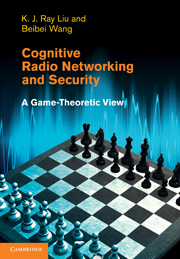Book contents
- Frontmatter
- Contents
- Preface
- Part I Cognitive radio communications and cooperation
- Part II Resource awareness and learning
- 10 Reinforcement learning for energy-aware communications
- 11 Repeated games and learning for packet forwarding
- 12 Dynamic pricing games for routing
- 13 Connectivity-aware network lifetime optimization
- 14 Connectivity-aware network maintenance and repair
- Part III Securing mechanism and strategies
- References
- Index
12 - Dynamic pricing games for routing
from Part II - Resource awareness and learning
Published online by Cambridge University Press: 06 December 2010
- Frontmatter
- Contents
- Preface
- Part I Cognitive radio communications and cooperation
- Part II Resource awareness and learning
- 10 Reinforcement learning for energy-aware communications
- 11 Repeated games and learning for packet forwarding
- 12 Dynamic pricing games for routing
- 13 Connectivity-aware network lifetime optimization
- 14 Connectivity-aware network maintenance and repair
- Part III Securing mechanism and strategies
- References
- Index
Summary
In self-organized mobile ad hoc networks (MANETs), where each user is its own authority, fully cooperative behaviors, such as unconditionally forwarding packets for each other or honestly revealing private information, cannot be directly assumed. The pricing mechanism is one way to provide incentives for the users to act cooperatively by awarding some payment for cooperative behaviors. In this chapter, we consider efficient routing in self-organized MANETs and model it as multi-stage dynamic pricing games. A game-theoretic framework for dynamic pricing-based routing in MANETs is considered to maximize the sender/receiver's payoff by invoking the dynamic nature of MANETs. Meanwhile, the forwarding incentives of the relay nodes can also be maintained by optimally pricing their packet-forwarding services on the basis of auction rules and introducing a cartel-maintenance enforcing mechanism. The simulation results illustrate that the dynamic pricing-based routing approach provides significant performance gains over the existing static pricing approaches.
Introduction
In recent years, MANETs have received much attention due to their potential applications and the proliferation of mobile devices. In general, MANETs wireless multi-hop networks formed by a set of mobile nodes without requiring centralized administration or fixed network infrastructure, in which nodes can communicate with other nodes located beyond their direct-transmission ranges through cooperatively forwarding packets for each other. In traditional crisis or military situations, the nodes in a MANET usually belong to the same authority and work in a fully cooperative way of unconditionally forwarding packets for each other to achieve their common goals.
- Type
- Chapter
- Information
- Cognitive Radio Networking and SecurityA Game-Theoretic View, pp. 297 - 324Publisher: Cambridge University PressPrint publication year: 2010



